#the unpublished poems of e.e. cummings
Text



The Thing Is - Ellen Bass / The Unpublished Poems of E.E. Cummings / Birthday - Andrea Gibson
#parallels#web weaving#comparatives#the thing is#ellen bass#e.e. cummings#ee cummings#birthday#andrea gibson#lit#literature#writing#prose#poems#poem#poetry#the unpublished poems of e.e. cummings#the unpublished poems of ee cummings
6K notes
·
View notes
Text

— E. E. Cummings, Etcetera: The Unpublished Poems of E.E. Cummings
[text ID: But I’ll live my life if it kills me]
#e. e. cummings#quotes#literature#poem#poetry#I'll live my life even if it kills me#classic literature#dark academia aesthetics#dark academia
6K notes
·
View notes
Photo


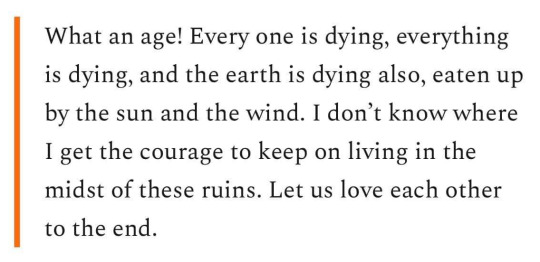

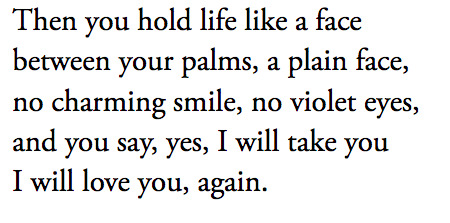
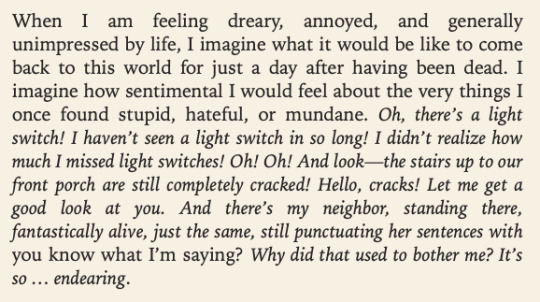




“good bones,” maggie smith // “the house of the dead,” fyodor dostoyevsky // letter from george sand to gustave flaubert, 27 Jun 1870 // “free,” florence + the machine // “the thing is,” ellen bass // “encyclopedia of an ordinary life,” amy krouse rosenthal // “october,” mary oliver // letter from vincent van gogh to theo van gogh, 11 August 1879 // “etcetera: the unpublished poems of e.e. cummings“ // “livin’ it up on top,” hadestown
#what i'm living toward in 2023#web weaving#maggie smith#fyodor dostoevsky#florence + the machine#ellen bass#amy krouse rosenthal#mary oliver#vincent van gogh#e.e. cummings#hadestown#quotes#mp
2K notes
·
View notes
Text
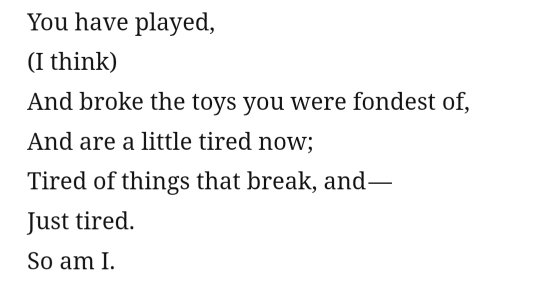
E.E. Cummings, "You Are Tired (I Think)" from Etcetera: The Unpublished Poems
#ee cummings#ur right mr.cummings i am tired#poetry#pretty words#etcetera the unpublished poems#you are tired (i think)
5 notes
·
View notes
Text

E.E. Cummings, from Etcetera: The Unpublished Poems of E.E. Cummings
#e. e. cummings#poetry#literature#lit#moon#poems for a full moon#quotes#quotations#quote#literary quotes#poetry quotes#poetry excerpt
23 notes
·
View notes
Photo

— E. E. Cummings, Etcetera: The Unpublished Poems of E.E. Cummings
1 note
·
View note
Quote
love is a guess / that deepens / (time is a rose / which opens) / your eyes,my / darling,are two /young worlds of dew / never yet named
E.E. Cummings, from ‘love is a guess..’, Etcetera: The Unpublished Poems of E.E. Cummings
#lord..#lit#quotes#poetry#e.e. cummings#love is a guess#etcetera: the unpublished poems of e.e. cummings#the lovers#fr#reading#m#x#is this a queue which i see before me?
334 notes
·
View notes
Text
A lovely human asked me to compile a list of the books I’ve referenced in my fic ‘To Know and To Grow’ and I thought it was a great idea so below is a list of them along with the author of each book. I’ve always been an avid reader and getting to include snippets from some of the works I enjoy and have read throughout my life has been one of the best parts about writing this story. I may have missed one or two books or authors, so forgive me if I have!
Ferns To Know and To Grow - F. Gordon Foster (aka the book that started it all)
The Tempest - Shakespeare
Romeo and Juliet - Shakespeare
Hamlet - Shakespeare
Othello - Shakespeare
Winnie The Pooh - A.A Milne
100 Selected Poems - E.E Cummings
95 Poems - E.E Cummings
The Secret Garden - Frances Hodgson Burnett
The Outsiders - S.E Hinton
The Great Gatsby - F. Scott Fitzgerald
Leaves of Grass - Walt Whitman
Little Women - Louisa May Alcott
Pleasures and Days - Marcel Proust
A Grief Observed - C.S Lewis
An International Episode - Henry James
The Colossus and Other Poems - Sylvia Plath
The Age of Innocence - Edith Wharton
The Marvelous World of Oz - L. Frank Baum
To Kill A Mockingbird - Harper Lee
The Call Of The Wild - Jack London
Tex - S.E Hinton
A Tree Grows in Brooklyn - Betty Smith
Wuthering Heights - Emily Bronte
To the Lighthouse - Virginia Woolf
Anne of Green Gables - L.M Montgomery
John of the Mountains: The Unpublished Journals of John Muir - John Muir, Linnie Marsh Wolfe
Robinson Crusoe - Daniel Defoe
Queen Mary - Alfred Tennyson
The Use of Life - John Lubbock
Tuck Everlasting - Natalie Babbitt
18 notes
·
View notes
Text
letter insomniac
ever so unclear and imagine
of all the questions I should wonder, this blue light
why am I so cruel and a fruit fly
if I am generous, traversing
and why am I generous the screen
if I am cruel appearing to be umlaut
a letter in the impossible
alphabet, a letter
which looks
as if
it has a very
belongs thin waist
to the Hebrew more than
to anything else mayhap
mad machine* fossilized I never knew such a sensual
lizard enjoyment of reading.
tail lol
jaw schizophrenic writing? and even
claw I don’t think so. if it is
all lizard’s what’s
alphabet wrong (with you)
unanswered words
do wonders
reassure enough is not
fissure enough, enough
susurrus is never
sylphic syllogism enough, what are you talking about,
really enough
really of this galimatias
yes
really n o n s e n s e
reel
all
lyretailed “Are we to blame if your skeleton cracks
curtained In our heavy, tender paws?”*
alluded Alexander Blok. 1918.
mansplain Derrida to me please. I badly need it. so you want me pleading at your feet? not going to happen
gaudeamus igitur
detour
I rather admired your writings. they kept me marvelously sustained. “on the last day God found six crumbs” (or something) E.E. Cummings; naturally. glitter. a whole lot of things is going on in your rear mirror in this city, as opposed to the windshield. you fling me into empyrean realms
Europeans. Westerners. imagine themselves conquerors
subjugators
pathetic
notlongago
withoutfurtherado I’ll show you my anger.
you will be delighted.
sputtering fire
“It’s okay… I am easygoing,” she said and frowned. “I was a lawyer.” - “there are so many wasalawyers.” rude.
I know all (all) contemporary Russian poets, as you probably guessed, and although I translated mainly Vitaly Pukhanov, who is one of the greatest, and half a dozen of others, I think, the very greatest is Alina Vitukhnovskaya, whom I cannot translate
I’m underequipped.
she's immense.
I am reminded for some reason about my female friend, who on her birthday was forced to stay in bed for one more hour after she woke up in order to make it possible for your husband to bring her coffee, in the fulfillment of his idea “to serve” her on that day. what can bring you to despair quicker than inscription Texas Forever that your meandering sight unfortunately catches an eyeful of?
I.1.
“I had lived in the twentieth century twenty years.” Denis Karasyov (translation is mine).
so you quit smoking.
I.2.
To rework books read into texts is an honorable duty of every sleepless worm
I.3
Unsafe and insane.
I.4
But should you ask them “why?”, they would tell you that henceforward they are to live according to the Moscow time, and never diverge, no matter where they find themselves on the planet.
I.5
No, I don’t think I can count like that. It won’t work.
Tudor. infant. elephantine. elephant inexplicable. the birth of labyrinth daydreaming about your many tongues. a difficult bird to catch: red tuff, nimb body, long wings. I am rather undead this morning. pleasantly undead. a cadaver. palaver. glory, see me. gore. may I be allowed to despair? in a cantankerous voice, what despair? thin-legged birds ingratiating themselves to the caretaker. bowing smart heads with glistening round unblinking eyes, and tying their necks into intricate knots. ravenous creatures sustaining themselves on fish ossifized pinkish tissues. Achoo! tobacco crumbs.
the swan locked in chains, with a neck tied in a knot, served to alchemists as an expression of the common place–the double-edged impossibility of the statement: interior and exterior, inner and outer, begotten both by the inward and the outward (rotating and unfolding); the statement precluded by the self and forbidden by others.
compelled to claim you.
perhaps I decided to abort my “jet stream” prematurely. the thought of what I am going to write now, after it, is a thought of a desperation of kinds. I just allowed myself to write, must I chuck it out like that?on the other hand, should I continue, what would I produce? pages and pages of unpublishable / unreadable stuff. I am already beyond one hundred pages.I envy poets who have a strong voice of discipline in them. it is always poetry, and recognizable too. a beauty of endlessly perfected form. a snail going in and out of its spiral. and after it dies, a treasure is ready. clean it a bit from dried specter of weed and put on a shelf. is not it nice?
oh the Berlin wall. bricks falling out
travel into the language. yes
venture betraying immediacy of speech. blurt it out and then collect yourself.whatever the language is, speech precedes it, Sausseur says (like syntax a system follows syntax an occasion, probably). the best actress in the world. interesting. phantom poem. you know you saw it but it’s no longer there. he asked me: “do you have a claustrophobia during fogs?”
actually, he:
1) had a writing “I will learn to communicate my needs,” one phrase, over and over again, produced in a brisk, accurate, elegant handwriting, on several pages:
I will learn to communicate my needs
I will learn to communicate my needs
his right hand was sore. (some senseless bitch made him do it);
2) sent an erotic novel to a wrong email address due to a typo;
3) fell asleep listening to the recording of rain in Austin. tropical storm in fact.
whereas, she:
1) watched the burlesque “The Devil and the Virgin” not lowering her fan for a second, and then said: “somehow one knows that the lady is not a virgin but the devil herself.”
2) marble statue, she produced for a writing marble inscriptions mostly. fading away ancient fragments.
3) teasing the beast for years, she has never been seriously threatened, she confided in me with a note of hushed disappointment in her fading voice.
I can’t take it any longer.
reduced to handwriting
_________________________________
*I am a machine, a robot programmed to update half a dozen social platforms at a rate once half an hour by the very least. if I fail, I am punished by demons at night. why is this that you wish to touch hearts? what is the goal of such endeavour, if I am allowed to ask? do you wish to transform hearts / wound hearts / heal them (that’s naive) / make them alert to your existence / make them more aware of their own existence perhaps? I wonder.
**two lines out of the poem entitled "Scynthians." by “us” Alexander Blok meant “Asians” (Russians). a very interesting poem. for Blok. who was about as European as a Russian could be. and who extremely rarely (although with great results) yielded to the nightmarish feeling of one’s own unwarranted grandeur, the feeling also known as “patriotism.” the poem “Scythians” (and a sweet threat to smother in (veritably clawed) paws) is directed at “the West” (in its European incarnation).
13 notes
·
View notes
Photo
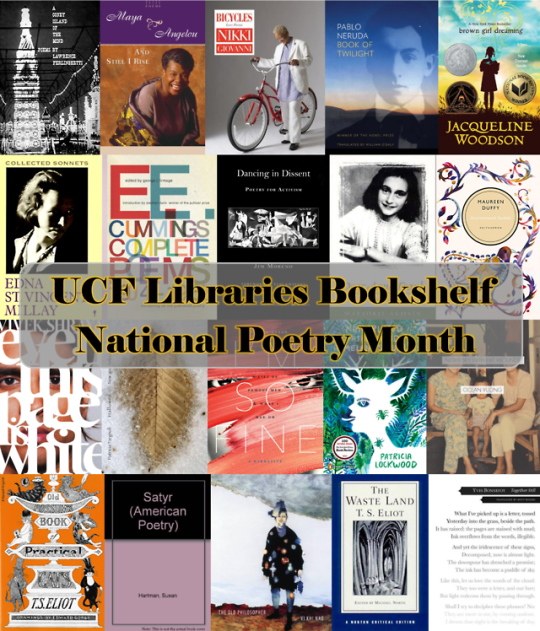
“If you are a dreamer, come in,
If you are a dreamer, a wisher, a liar,
A hope-er, a pray-er, a magic bean buyer…
If you’re a pretender, come sit by my fire
For we have some flax-golden tales to spin.
Come in!
Come in!”
-Shel Silverstein, Where the Sidewalk Ends
Welcome to National Poetry Month!
The Academy of American Poets, inspired by the success of Black History Month and Women’s History Month, created National Poetry Month in 1996. It is the largest literary celebration in the world and UCF Libraries are proud to do their part.
UCF Libraries have gathered suggestions for 20 books of poetry that are currently in the UCF collection. These works represent a wide range of favorite poetry books of our faculty and staff. These, and additional titles, are also on the Featured Bookshelf display on the second (main) floor next to the bank of two elevators.
Click on the Keep Reading link below to see the full descriptions and catalog links.
A Coney Island of the Mind by Lawrence Ferlinghetti
Includes 29 poems revolving around the title selections written for oral readings with jazz accompaniment and 13 previously published poems The title of this book is taken from Henry Miller s Into the Night Life and expresses the way Lawrence Ferlinghetti felt about these poems when he wrote them during a short period in the 1950 s as if they were taken together a kind of Coney Island of the mind a kind of circus of the soul The title of this book is taken from Henry Miller s and expresses the way Lawrence Ferlinghetti felt about these poems when he wrote them during a short period in the 1950s as if they were taken together a kind of Coney Island of the mind a kind of circus of the soul.
Suggested by Brian Calhoun, Research & Information Services
And Still I Rise by Maya Angelou
Maya Angelou’s third book of verse. These poems are powerful, distinctive, and fresh—and, as always, full of the lifting rhythms of love and remembering. And Still I Rise is written from the heart, a celebration of life as only Maya Angelou has discovered it.
Suggested by Missy Murphey, Research & Information Services
Bicycles: love poems by Nikki Giovanni
With Bicycles, she's collected poems that serve as a companion to her 1997 Love Poems. An instant classic, that book-romantic, bold, and erotic-expressed notions of love in ways that were delightful unexpected. In the years that followed, Giovanni experienced losses both public and private. Collected poems that serve as a companion to Giovanni's 1997 Love Poems. That book--romantic, bold, and erotic--expressed notions of love in ways that were delightfully unexpected. Giovanni rediscovered love--what she calls the antidote. Here romantic love--and all its manifestations, the physical touch, the emotional pull, the hungry heart--is distilled as never before by one of our most talented poets.
Suggested by Missy Murphey, Research & Information Services
Book of Twilight by Pablo Neruda; William O'Daly (Translator)
When Nobel Laureate Pablo Neruda was a teenager, he pawned a family heirloom to fund the publication of his first book, Book of Twilight, which―until now―has never been published in its entirety in the United States. Presenting the highly romantic style refined and empowered in his later books, Neruda's debut introduces a bold poet unafraid to take risks, push boundaries, and write towards an unapologetic romanticism. Everything we know about Neruda―all his gestures, hyperbole, and effusiveness―appears vividly and for the first time in these poems. William O'Daly's superb English translations are presented with the original Spanish en face.
Suggested by Megan Haught, Teaching & Engagement/Research & Information Services
Brown Girl Dreaming by Jacqueline Woodson
Raised in South Carolina and New York, Woodson always felt halfway home in each place. In vivid poems, she shares what it was like to grow up as an African American in the 1960s and 1970s, living with the remnants of Jim Crow and her growing awareness of the Civil Rights movement. Touching and powerful, each poem is both accessible and emotionally charged, each line a glimpse into a child’s soul as she searches for her place in the world. Woodson’s eloquent poetry also reflects the joy of finding her voice through writing stories, despite the fact that she struggled with reading as a child. Her love of stories inspired her and stayed with her, creating the first sparks of the gifted writer she was to become.
Suggested by Brian Calhoun, Research & Information Services
Collected Sonnets of Edna St. Vincent Millay by Edna St. Vincent Millay
More than 180 sonnets selected from Millay's books of poems -- including 20 sonnets from Mine the Harvest not contained in previous editions of her Collected Sonnets -- are brought together in this new, expanded edition.
Suggested by Larry Cooperman, Research & Information Services
Complete Poems: 1904-1962 by E.E. Cummings
Combining Thoreau’s controlled belligerence with the brash abandon of an uninhibited bohemian, E. E. Cummings, together with Ezra Pound, T. S. Eliot, and William Carlos Williams, helped bring about the twentieth-century revolution in literary expression. Today Cummings is recognized as the author of some of the most sensuous lyric poems in the English language, as well as one of the most inventive American poets of his time. Formally fractured and yet gleefully alive and whole, at once cubistic and figurative, Cummings’s work expanded the boundaries of what language is and can do. It includes 36 poems that were first collected in the 1991 edition and 164 unpublished poems issued in 1983 under the title Etcetera. It spans his earliest creations, his vivacious linguistic acrobatics, up through his last valedictory sonnets.
Suggested by Seth Dwyer, Circulation
Dancing in Dissent: poetry for activism by Jim Moreno
Dancing in Dissent is an artivist¡¯s (artist and activist) collection of poetry resonating with the legacy of, speaking out against injustice and oppression. As you read this book as a community of peaceful dissent from a poet among poets “know that corporate amerikkka is not pleased."
Suggested by Sheila Green, Research & Information Services
Dear Anne Frank: poems by Marjorie Agosín
Poems in English and Spanish pay tribute to Anne Frank, noting her courage, love for life, and individuality in the face of painful experiences.
Suggested by Schuyler Kerby, Rosen Library
Environmental Studies by Maureen Duffy
Centered on environments – human, insect and animal – some experienced personally, some observed, some imagined. Though strictly contemporary in her concerns, she reaches back in her poetry to childhood, and beyond that in her imagination to cultural figures of the past – John Donne, Edward Elgar, Ralph Vaughan Williams, bringing them lucidly and vividly to life. There is a strong sense of compassion and fair play in her poems, reflecting Duffy’s lifelong support for progressive social and political movements, and a beautiful lyricism and technical skill derived from her love of the classical world and Old and Mediaeval English. As so often in her work, London past and present provides the backdrop to her real and imagined life stories: of love and loss, forebears and friends, the humorous and sometimes painful experiences of old age.
Suggested by Christina Wray, Teaching & Engagement
Even This Page is White by Vivek Shraya
Vivek Shraya's debut collection of poetry is a bold and timely interrogation of skin—its origins, functions, and limitations. Poems that range in style from starkly concrete to limber break down the barriers that prevent understanding of what it means to be racialized. Shraya paints the face of everyday racism with words, rendering it visible, tangible and undeniable.
Suggested by Sara Duff, Acquisitions & Collections
Hallowed: new and selected poems by Patricia Fargnoli
Featuring selections from Patricia Fargnoli's four previous books along with twenty-four new poems, here is a celebration of poetic endurance, filled with quietly distinctive cadences and images closely seen, now freshly understood.
Suggested by Megan Haught, Teaching & Engagement/Research & Information Services
I’m So Fine: a list of famous men and what I had on by Khadijah Queen Part 1980s and 1990s nostalgia, part exuberant storytelling, I'm So Fine: A List of Famous Men & What I Had On turns a sharply humorous magnifying glass onto gendered interactions in daily life, framed primarily by random celebrity encounters in Los Angeles. Far from a narrative of fame-chasing or conceit, however, I'm So Fine breathlessly addresses what it means for a woman to fight for dignity and survival in an often hostile environment, to come into her own power as she decides what she wants for herself '& mostly gets its every fineness.
Suggested by Sara Duff, Acquisitions & Collections
Motherland, Fatherland, Homelandsexuals by Patricia Lockwood
A breathtaking new collection from one of today's boldest and most adventurous poets; Colloquial and incantatory, the poems in Patricia Lockwood's second collection address the most urgent questions of our time, like: what if a deer did porn? Is America going down on Canada? What happens when Niagara Falls gets drunk at a wedding? Is it legal to marry a stuffed owl exhibit? What would Walt Whitman's tit-pics look like? Why isn't anyone named Gary anymore? Did the Hatfield and McCoy babies ever fall in love? The steep tilt of Lockwood's lines sends the reader snowballing downhill, accumulating pieces of the scenery with every turn. The poems' subject is the natural world, but their images would never occur in nature. This book is serious and funny at the same time, like a big grave with a clown lying in it.
Suggested by Sara Duff, Acquisitions & Collections
Night Sky with Exit Wounds by Ocean Vuong
Ocean Vuong's first full-length collection aims straight for the perennial "big"—and very human—subjects of romance, family, memory, grief, war, and melancholia. None of these he allows to overwhelm his spirit or his poems, which demonstrate, through breath and cadence and unrepentant enthrallment, that a gentle palm on a chest can calm the fiercest hungers.
Suggested by Sandy Avila, Research & Information Services
Old Possum’s Book of Practical Cats by T.S. Eliot
Old Possum's Book of Practical Cats is a collection of whimsical poems by T. S. Eliot about feline psychology and sociology, published by Faber and Faber. It is the basis for the musical Cats.
Suggested by Becky Hammond, Special Collections & University Archives
Satyr by Susan Hartman
Chapbook of poems. A chapbook is a type of popular literature printed in early modern Europe. Produced cheaply, chapbooks were commonly small, paper-covered booklets, usually printed on a single sheet folded into books of 8, 12, 16 and 24 pages.
Suggested by Brian Calhoun, Research & Information Services
The Old Philosopher by Vi Khi Nao
The Old Philosopher is enigmatic, sexual, biblical, anachronistic, political, and personal all at once. These quiet, implosive poems inhabit a nonlinear temporality in which Vi Khi Nao brings biblical time and political time together in the same poetic space, allowing current affairs to converse with a more ancient and historical reality.
Suggested by Sandy Avila, Research & Information Services
The Waste Land by T.S. Eliot
The text of Eliot's 1922 masterpiece is accompanied by thorough explanatory annotations as well as by Eliot's own knotty notes, some of which require annotation themselves.
Suggested by Athena Hoeppner, Acquisition & Collections/Research & Information Services
Together Still: follow by perambulans in Noctem by Yves Bonnefoy
The international community of letters mourned the recent death of Yves Bonnefoy, universally acclaimed as one of France’s greatest poets of the last half century. A prolific author, he was often considered a candidate for the Nobel Prize and published a dozen major collections of poetry in verse and prose, several books of dream-like tales, and numerous studies of literature and art. His oeuvre has been translated into scores of languages, and he himself was a celebrated translator of Shakespeare, Yeats, Keats, and Leopardi.
Suggested by Megan Haught, Teaching & Engagement/Research & Information Services
1 note
·
View note
Text

E.E. Cummings, from Etcetera: The Unpublished Poems of E.E. Cummings
#e. e. cummings#etcetera#poetry#literature#poetry excerpt#death#quotes#lit#quotations#quote#literary quotes#poetry quotes
3 notes
·
View notes
Photo
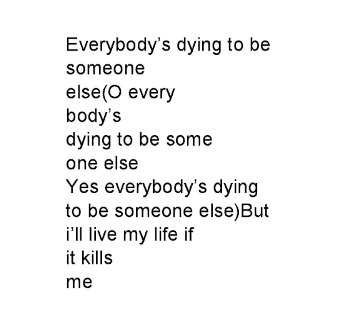
E.E. Cummings, ‘I’m very fond of...’, Etcetera: The Unpublished Poems of E.E. Cummings
#lit#quotes#poetry#e.e. cummings#etcetera: the unpublished poems of e.e. cummings#fragments of self-hood#typography#reading#m#x#is this a queue which i see before me?
305 notes
·
View notes
Photo

E.E. Cummings, ‘Semi-Spring’, Etcetera: The Unpublished Poems of E.E. Cummings
#lit#quotes#poetry#e.e. cummings#spring#semi-spring#etcetera: the unpublished poems of e.e. cummings#reading#m#is this a queue which i see before me?
154 notes
·
View notes
Text
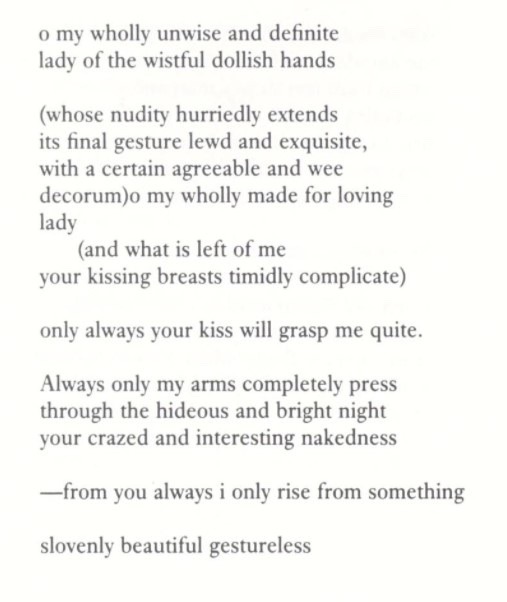
E.E. Cummings, from Etcetera: The Unpublished Poems of E.E. Cummings
#e. e. cummings#etcetera#poetry#literature#lit#love#kiss#poetry quote#quotes#quotations#literary quotes#book quotes#poetry excerpt
17 notes
·
View notes
Text

E.E. Cummings, from Etcetera: The Unpublished Poems of E.E. Cummings
#e. e. cummings#etcetera#poetry#poems for a full moon#literature#lit#moon#love#lovers#on loving#quotes#quotations#literary quotes#poetry quotes
15 notes
·
View notes
Text

E.E. Cummings, from Etcetera: The Unpublished Poems of E.E. Cummings
#e. e. cummings#etcetera#poetry#lit#literature#spring#quotes#quotations#quote#literary quotes#poetry quotes#poetry excerpt
2 notes
·
View notes